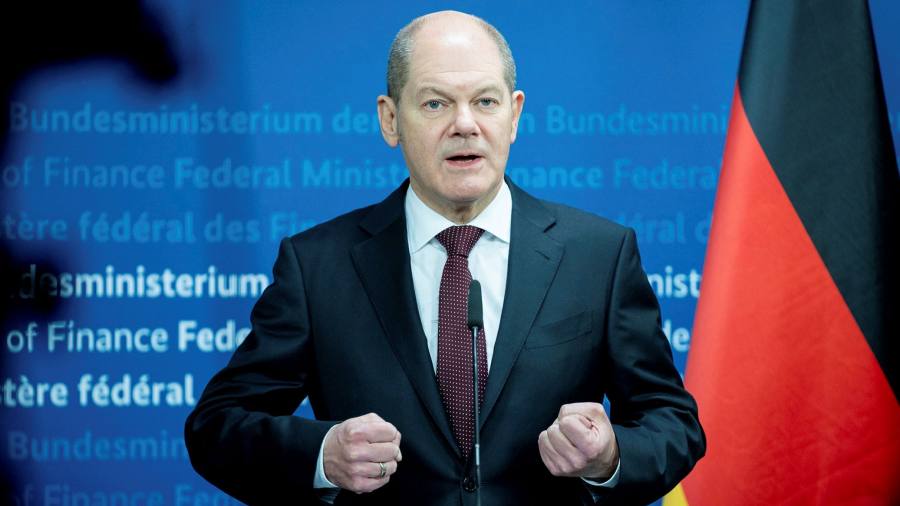[ad_1]
Germany is to create a special financial task force capable of carrying out forensic audits of companies suspected of fraud, part of a wide-ranging reform of financial regulator BaFin triggered by the Wirecard scandal.
“I want a financial supervisory authority with bite,†said Olaf Scholz, finance minister, announcing the reforms on Tuesday. Tougher oversight is “good for Germany’s financial markets and for investor protectionâ€.
Mr Scholz said the planned shake-up of BaFin would make it “more powerful, more rigorous and more effectiveâ€.
The minister was speaking four days after pushing out BaFin’s chief, Felix Hufeld, who had become a lightning rod for criticism of the regulator and its failure to follow up on countless media and analyst reports about suspected fraud at Wirecard, the payments processor. Elisabeth Roegele, Mr Hufeld’s deputy, was also forced out.
Wirecard announced last June that €1.9bn in cash was missing from its accounts, and, within a week, collapsed into insolvency. Its former chief executive Markus Braun is under investigation, suspected of running a criminal racket that defrauded creditors of €3.2bn. He denies wrongdoing.
Criticism of BaFin has centred on its decision to target the very journalists and short sellers who exposed financial irregularities at Wirecard, and for overriding Bundesbank objections to impose a two-month ban on shorting Wirecard stock.
Revelations that BaFin staff actively bought and sold Wirecard shares when the company was coming under increasing scrutiny from the authorities have also caused consternation in Berlin. Just last week, the regulator disclosed that it had filed a criminal complaint against an employee for insider trading with Wirecard shares in June last year.
Jörg Kukies, Germany’s deputy finance minister, said it was “beyond dispute that, in the past, mistakes were madeâ€.
“When there are concrete indications of accounting fraud, as was often the case with Wirecard, we want to create a situation where BaFin addresses such tip-offs, processes them and deals with them effectively,†he added.
The reform of BaFin is contained in a seven-point plan, based on proposals by consultancy Roland Berger, whose centrepiece is a “focused oversight body†to supervise complex companies. The Wirecard saga revealed that oversight of such firms in Germany is too often split between separate bodies responsible for the banking sector, financial markets and money laundering, and some companies fall through the cracks.
The plan also foresees the creation of a new BaFin task force able to carry out investigations into companies suspected of financial irregularities. The regulator would also hire more of its own auditors to carry out such probes.
“When the concrete tip-offs come in, BaFin must always be able to undertake a forensic investigation [like the special audit carried out by KPMG into Wirecard], and be equipped with the sovereign powers to do so,†said Mr Kukies.
Mr Scholz said the reform would also ensure that BaFin took information from whistleblowers more seriously, and did more to protect the rights of investors and consumers. The position of its president will be strengthened, and its IT capabilities improved.
The BaFin reform builds on an “action plan†unveiled by the finance ministry last summer that promised a broad shake-up of regulation in the wake of Wirecard. One of the proposals it contains is for the Big Four accounting firms to more clearly separate their auditing and consulting services and for companies to change their auditor every 10 years.
But the finance ministry’s plan for BaFin was criticised by MPs. Hans Michelbach, the finance spokesman of the CSU, part of Angela Merkel’s coalition, described it as “completely inadequateâ€. “A reform of BaFin must above all secure [its] independence,†he said. “Herr Scholz didn’t say anything about that.â€
He referred to the European Securities and Markets Authority’s report into the Wirecard saga that criticised BaFin’s “deficient†handling of the scandal. “Esma revealed serious shortcomings in German financial regulation and . . . Herr Scholz’s reform plans barely address them.â€
“Olaf Scholz is trying to sell himself as the big reformer and so to distract attention from his own failures in the Wirecard affair,†said Lisa Paus, a finance spokesperson for the opposition Greens.
[ad_2]
Source link





